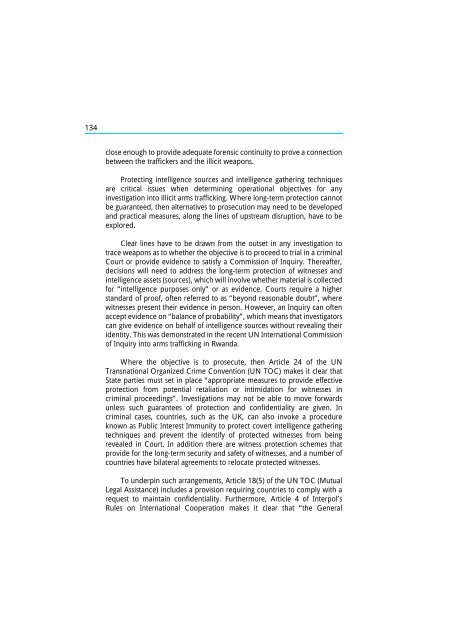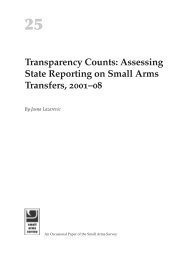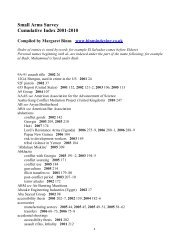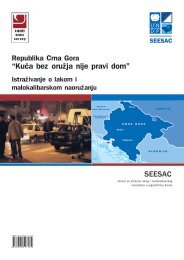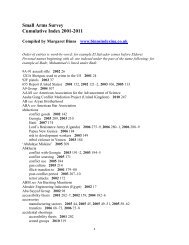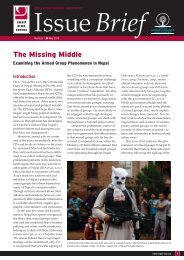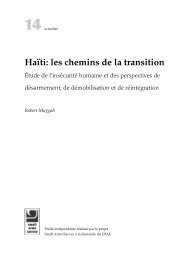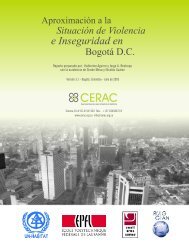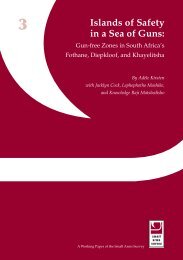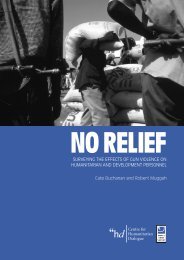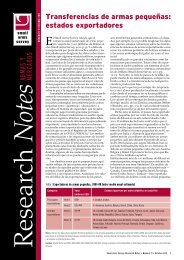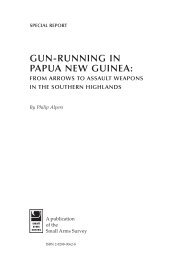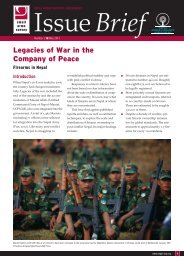The Scope and Implications of a Tracing Mechanism for Small Arms ...
The Scope and Implications of a Tracing Mechanism for Small Arms ...
The Scope and Implications of a Tracing Mechanism for Small Arms ...
You also want an ePaper? Increase the reach of your titles
YUMPU automatically turns print PDFs into web optimized ePapers that Google loves.
134<br />
close enough to provide adequate <strong>for</strong>ensic continuity to prove a connection<br />
between the traffickers <strong>and</strong> the illicit weapons.<br />
Protecting intelligence sources <strong>and</strong> intelligence gathering techniques<br />
are critical issues when determining operational objectives <strong>for</strong> any<br />
investigation into illicit arms trafficking. Where long-term protection cannot<br />
be guaranteed, then alternatives to prosecution may need to be developed<br />
<strong>and</strong> practical measures, along the lines <strong>of</strong> upstream disruption, have to be<br />
explored.<br />
Clear lines have to be drawn from the outset in any investigation to<br />
trace weapons as to whether the objective is to proceed to trial in a criminal<br />
Court or provide evidence to satisfy a Commission <strong>of</strong> Inquiry. <strong>The</strong>reafter,<br />
decisions will need to address the long-term protection <strong>of</strong> witnesses <strong>and</strong><br />
intelligence assets (sources), which will involve whether material is collected<br />
<strong>for</strong> “intelligence purposes only” or as evidence. Courts require a higher<br />
st<strong>and</strong>ard <strong>of</strong> pro<strong>of</strong>, <strong>of</strong>ten referred to as “beyond reasonable doubt”, where<br />
witnesses present their evidence in person. However, an Inquiry can <strong>of</strong>ten<br />
accept evidence on “balance <strong>of</strong> probability”, which means that investigators<br />
can give evidence on behalf <strong>of</strong> intelligence sources without revealing their<br />
identity. This was demonstrated in the recent UN International Commission<br />
<strong>of</strong> Inquiry into arms trafficking in Rw<strong>and</strong>a.<br />
Where the objective is to prosecute, then Article 24 <strong>of</strong> the UN<br />
Transnational Organized Crime Convention (UN TOC) makes it clear that<br />
State parties must set in place “appropriate measures to provide effective<br />
protection from potential retaliation or intimidation <strong>for</strong> witnesses in<br />
criminal proceedings”. Investigations may not be able to move <strong>for</strong>wards<br />
unless such guarantees <strong>of</strong> protection <strong>and</strong> confidentiality are given. In<br />
criminal cases, countries, such as the UK, can also invoke a procedure<br />
known as Public Interest Immunity to protect covert intelligence gathering<br />
techniques <strong>and</strong> prevent the identify <strong>of</strong> protected witnesses from being<br />
revealed in Court. In addition there are witness protection schemes that<br />
provide <strong>for</strong> the long-term security <strong>and</strong> safety <strong>of</strong> witnesses, <strong>and</strong> a number <strong>of</strong><br />
countries have bilateral agreements to relocate protected witnesses.<br />
To underpin such arrangements, Article 18(5) <strong>of</strong> the UN TOC (Mutual<br />
Legal Assistance) includes a provision requiring countries to comply with a<br />
request to maintain confidentiality. Furthermore, Article 4 <strong>of</strong> Interpol’s<br />
Rules on International Cooperation makes it clear that “the General


